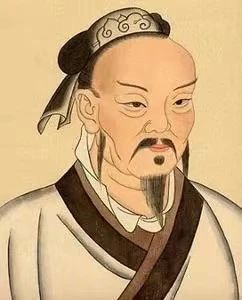
梁惠王曰:“寡人之于国也,尽心焉耳矣。河内凶,则移其民于河东,移其粟于河内。河东凶亦然。察邻国之政,无如寡人之用心者。邻国之民不加少,寡人之民不加多,何也?”
孟子对曰:“王好战,请以战喻。填然鼓之,兵刃既接,弃甲曳兵而走。或百步而后止,或五十步而后止。以五十步笑百步,则何如?”“不违农时,谷不可胜[2]食也;数罟不入池[3],鱼鳖不可胜食也;斧斤以时入山林,材木不可胜用也。谷与鱼鳖不可胜食,材木不可胜用,是使民养生丧死无憾也。养生丧死无憾,王道之始也。“五亩之宅,树之以桑,五十者可以衣[4]帛矣;鸡豚狗彘[5]之畜,无失其时,七十者可以食肉矣;百亩之田,勿夺其时,数口之家可以无饥矣;谨庠序之教,申之以孝悌之义,颁白者不负戴于道路矣。七十者衣帛食肉,黎民不饥不寒,然而不王[6]者,未之有也。“狗彘食人食而不知检,涂有饿莩[7]而不知发;人死,则曰:‘非我也,岁也。’是何异于刺人而杀之,曰:‘非我也,兵也。’王无罪岁,斯天下之民至焉。”King Hui of Liang said, “Small as my virtue is, in the government of my kingdom, I do indeed exert my mind to the utmost. If the year be bad on the inside of the river, I remove as many of the people as I can to the east of the river, and convey grain to the country in the inside. When the year is bad on the east of the river, I act on the same plan. On examining the government of the neighboring kingdoms, I do not find that there is any prince who exerts his mind as I do. And yet the people of the neighboring kingdoms do not decrease, nor do my people increase. How is this?”Mencius replied, “Your Majesty is fond of war—let me take an illustration from war. The soldiers move forward to the sound of the drums; and after their weapons have been crossed, on one side they throw away their coats of mail, trail their arms behind them, and run. Some run a hundred paces and stop; some run fifty paces and stop. What would you think if those who run fifty paces were to laugh at those who run a hundred paces?”The king said, “They should not do so. Though they did not run a hundred paces, yet they also ran away.”“Since Your Majesty knows this,” replied Mencius.“you need not hope that your people will become more numerous than those of the neighboring kingdoms. If the seasons of husbandry be not interfered with, the grain will be more than can be eaten. If close nets are not allowed to enter the pools and ponds, the fishes and turtles will be more than can be consumed. If the axes and bills enter the hills and forests only at the proper time, the wood will be more than can be used. When the grain and fish and turtles are more than can be eaten, and there is more wood than can be used, this enables the people to nourish their living and mourn for their dead, without any feeling against any. This condition, in which the people nourish their living and bury their dead without any feeling against any, is the first step of royal government.Let mulberry trees be planted about the homesteads with their five mu, and persons of fifty years may be clothed with silk. In keeping fowls, pigs, dogs, and swine, let not their times of breeding be neglected, and persons of seventy years may eat flesh. Let there not be taken away the time that is proper for the cultivation of the farm with its hundred mu, and the family of several mouths that is supported by it shall not suffer from hunger. Let careful attention be paid to education in schools, inculcating in it especially the filial and fraternal duties, and grey-haired men will not be seen upon the roads, carrying burdens on their backs or on their heads. It never has been that the ruler of a state, where such results were seen—persons of seventy wearing silk and eating flesh, and the blackhaired people suffering neither from hunger nor cold—did not attain to the royal dignity.Your dogs and swine eat the food of men, and you do not make any restrictive arrangements. There are people dying from famine on the roads, and you do not issue the stores of your granaries for them. When people die, you say, ‘It is not owing to me; it is owing to the year.’ In what does this differ from stabbing a man and killing him, and then saying—‘It was not I; it was the weapon?’Let Your Majesty cease to lay the blame on the year, and instantly from all the nation the people will come to you.”【注释】[1]直:只是。[2]胜:尽。[3]数罟:细密的渔网。数:细密。罟:渔网。洿池:池塘。[4]衣:动词,穿。[5]彘:猪。[6]王:以仁德统一天下。[7]莩:通“殍”,饿死的人。【译文】梁惠王说:“我对于国家,真的是尽心尽力了。河内遭遇饥荒,就把那里的百姓迁移到河东,把河东的粮食运到河内以赈济;河东遭遇荒年也是如此。观察邻国的政务,没有像我这样用心的。但邻国的百姓并没有减少,我的百姓并没有增多,这是为什么呢?”孟子回答说:“大王您喜欢打仗,请允许我用打仗来比喻。咚咚地击鼓进军,兵器已经相互撞击,有的士兵却扔掉盔甲拖着兵器逃跑。有人跑了一百步停下,有人跑了五十步停下。跑了五十步的人嘲笑跑了一百步的人,这样做怎么样呢?”梁惠王说:“不可以,只不过没有跑到一百步罢了,这也同样是逃跑呀!”孟子说:“大王如果懂得这个道理,那就不必期望您的百姓比邻国多了。“如果不违背农时,粮食就吃不完;细密的渔网不进池塘捕鱼,鱼鳖就吃不完;按照季节砍伐树木,木材便用不完。粮食和鱼鳖吃不完,木材用不完,这样就使百姓对供养活人埋葬死者没有什么不满。百姓对供养活人埋葬死者都没有不满,这就是王道的开端了。“五亩大的住宅,里面种上桑树,五十岁的人就可以穿上丝绵衣了;畜养鸡、猪、狗等家禽、家畜,按照它们繁殖的规律去饲养它们,七十岁的人都可以有肉吃了;百亩的耕地,不要耽误种田人的农时,数口人的家庭就不会有挨饿的情况了;认真地兴办学校教育,把孝敬父母、尊重兄长的道理反复讲给百姓听,那么,白发的老人就不会背着东西奔走在道路上了。七十岁的人有丝绵衣穿,有肉吃,普通百姓饿不着、冻不着,这样却不能统一天下的,是不曾有过的事。“(现在,富贵人家的)猪狗吃掉了人吃的食物却不加制止,路上有饿死的人却不知道打开粮仓赈救灾民。老百姓死了,竟说:‘这不是我的罪过,是年成不好造成的。’这种说法和拿着刀子刺死人后,却说:‘杀死人的不是我,是兵器’,有什么区别?王不要怪罪于年成不好,这样,天下的百姓都会前来归顺了。”【解读】在本章中,自我感觉已经用心治国的梁惠王心中充满了委屈:对待自然灾害虽然倾尽全力,结果却仍然是“邻国之民不加少,寡人之民不加多!”不解其中原因,孟子用高超的论辩智慧,解答了梁惠王的疑问。首先,孟子以作战为喻,用“五十步笑百步”的例子,启发梁惠王认识到自己头痛医头,脚痛医脚的做法同其他诸侯并没有本质区别。接着,孟子从根本入手提出了惠民仁政之策。头痛医头、脚痛医脚的小恩小惠是无法真正吸引广大百姓的,要想使百姓归顺,只有施行仁政:首先养民,使百姓“养生丧死无憾”;其次教民,“谨庠序之教,申之以孝悌之义”,让百姓受到教化。如此,才能够从根本上赢得百姓的拥戴。从孟子的描述中,可以感受到孟子“尚和合,求大同”的精神品格,这种精神品格影响了中华民族一代又一代的仁人志士,激励其为了理想的大同社会而奋斗。此外,孟子在当时能够提出维护生态平衡与自然和谐共生的理念(“数罟不入洿池,鱼鳖不可胜食也;斧斤以时入山林,材木不可胜用也”),也是极为深邃的,反映了古人的生活智慧。